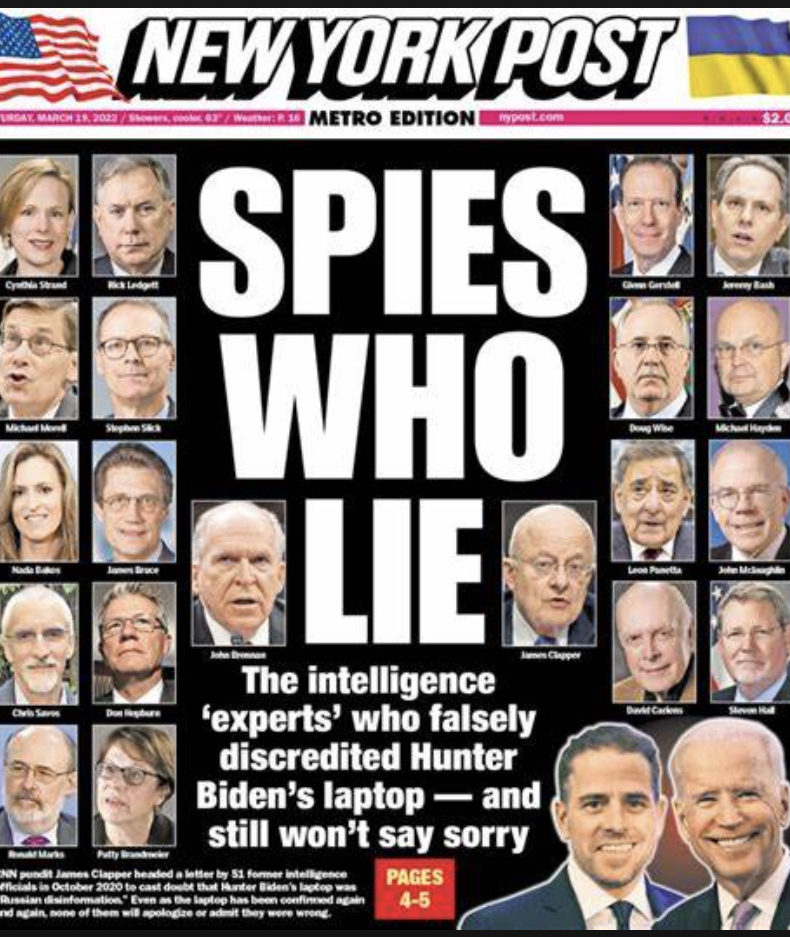
By Ray Cardello for December 13, 2022. Season 15 / Post 4
It is not wrong for former members of our Intel community to support political candidates, including men or women, running for President. The problem, or issue, with the 51 former No-tel hacks listed below is that they conspired, lied, and still stuck by or hid from the letter of misinformation they all signed. That letter claimed that the Hunter Biden laptop did not exist and that the idea was a product of Russian misinformation. This letter was used by politicians and the media to gaslight the public and to hide the reality that would have harmed Biden’s Presidential run. This letter was written on October 19, 2020, just weeks before the 2020 Presidential Election. Documents prove the FBI took possession of the Hunter Biden laptop in December 2019. The laptop that did not exist, according to these 51 individuals, had been in FBI headquarters for nearly a year. None of these lying former American spies will retract their claim.
I will not try and speculate who coordinated this letter and its impact on the election. The hearings will start in January, and let’s see who of the 51 are willing to lie under oath. These men and women need to be held accountable for their actions. It is the only way to restore some credibility in our government. That credibility was destroyed by the Lois Lerners and James Comeys of the swamp, who broke the rules, got caught, and retired with full benefits. We only need to be patient for a few weeks. January 3rd, the fun starts, and the onion gets peeled.
The Embarrassing Former Intel Hacks
John Brennan, former CIA director, now analyst for NBC and MSNBC: Didn’t respond.
Thomas Fingar, former National Intelligence Council chair, now teaches at Stanford University: Didn’t respond.
Rick Ledgett, former National Security Agency deputy director, now a director at M&T Bank: Didn’t respond.
John McLaughlin, former CIA acting director, now teaches at Johns Hopkins University: Didn’t respond.
Michael Morell, former CIA acting director, now at George Mason University: Didn’t respond.
Mike Vickers, former defense undersecretary for intelligence, now on board of BAE Systems: Didn’t respond.
Doug Wise, former Defense Intelligence Agency deputy director, teaches at University of New Mexico: Didn’t respond.
Nick Rasmussen, former National Counterterrorism Center director, now executive director, Global Internet Forum to Counter Terrorism: Didn’t respond.
Russ Travers, former National Counterterrorism Center acting director: “The letter explicitly stated that we didn’t know if the emails were genuine, but that we were concerned about Russian disinformation efforts. I spent 25 years as a Soviet/Russian analyst. Given the context of what the Russians were doing at the time (and continue to do — Ukraine being just the latest example), I considered the cautionary warning to be prudent.”
Andy Liepman, former National Counterterrorism Center deputy director: “As far as I know I do [stand by the statement] but I’m kind of busy right now.”
John Moseman, former CIA chief of staff: Didn’t respond.
Larry Pfeiffer, former CIA chief of staff, now senior advisor to The Chertoff Group: Didn’t respond.
Jeremy Bash, former CIA chief of staff, now analyst for NBC and MSNBC: Didn’t respond.
Rodney Snyder, former CIA chief of staff: Didn’t respond.
Glenn Gerstell, former National Security Agency general counsel: Didn’t respond.
David Priess, former CIA analyst and manager: “Thank you for reaching out. I have no further comment at this time.”
Pam Purcilly, former CIA deputy director of analysis: Didn’t respond.
Marc Polymeropoulos, former CIA senior operations officer: Didn’t respond.
Chris Savos, former CIA senior operations officer: Didn’t respond.
John Tullius, former CIA senior intelligence officer: Didn’t respond.
David A. Vanell, former CIA senior operations officer: Didn’t respond.
Kristin Wood, former CIA senior intelligence officer, now non-resident fellow, Harvard: Didn’t respond.
David Buckley, former CIA inspector general: Didn’t respond.
Nada Bakos, former CIA analyst and targeting officer, now senior fellow, Foreign Policy Research Institute: Didn’t respond.
Patty Brandmaier, former CIA senior intelligence officer: Didn’t respond.
James B. Bruce, former CIA senior intelligence office: Didn’t respond.
David Cariens, former CIA intelligence analyst: Didn’t respond.
Janice Cariens, former CIA operational support officer: Didn’t respond.
Paul Kolbe, former CIA senior operations officer: Didn’t respond.
Peter Corsell, former CIA analyst: Didn’t respond.
Brett Davis, former CIA senior intelligence officer: Didn’t respond.
Roger Zane George, former national intelligence officer: Didn’t respond.
Steven L. Hall, former CIA senior intelligence officer: Didn’t respond.
Kent Harrington, former national intelligence officer: Didn’t respond.
Don Hepburn, former national security executive, now President of Boanerges Solutions LLC: “My position has not changed any. I believe the Russians made a huge effort to alter the course of the election . . . The Russians are masters of blending truth and fiction and making something feel incredibly real when it’s not. Nothing I have seen really changes my opinion. I can’t tell you what part is real and what part is fake, but the thesis still stands for me, that it was a media influence hit job.”
Timothy D. Kilbourn, former dean of CIA’s Kent School of Intelligence Analysis: Didn’t respond.
Ron Marks, former CIA officer: Didn’t respond.
Jonna Hiestand Mendez, former CIA technical operations officer, now on board of the International Spy Museum: “I don’t have any comment. I would need a little more information.”
Emile Nakhleh, former director of CIA’s Political Islam Strategic Analysis Program, now at University of New Mexico: “I have not seen any information since then that would alter the decision behind signing the letter. That’s all I can go into. The whole issue was highly politicized and I don’t want to deal with that. I still stand by that letter.”
Gerald A. O’Shea, former CIA senior operations officer: Didn’t respond.
Nick Shapiro, former CIA deputy chief of staff and senior adviser to the director: Didn’t respond.
John Sipher, former CIA senior operations officer: Declined to comment.
Stephen Slick, former National Security Council senior director for intelligence programs:
Didn’t respond.
Cynthia Strand, former CIA deputy assistant director for global issues: Didn’t respond.
Greg Tarbell, former CIA deputy executive director: Didn’t respond.
David Terry, former National Intelligence Collection Board chairman: Couldn’t be reached.
Greg Treverton, former National Intelligence Council chair, now senior adviser at the Center for Strategic and International Studies: “I’ll pass. I haven’t followed the case recently.”
Winston Wiley, former CIA director of analysis: Couldn’t be reached.
Categories: Uncategorized
